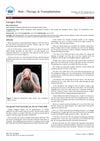 January 2021 in “Mastology”
January 2021 in “Mastology” Scalp cooling therapy helped over 80% of women keep at least half their hair during chemotherapy.
June 2020 in “Research Square (Research Square)” Oral contraceptives with CPA improve overall quality of life for women with PCOS.

30% supramolecular salicylic acid is safe and effective for treating mild to moderate facial acne.
March 2020 in “Annals of internal medicine” Monitor methotrexate side effects, research cannabis treatments, and use mycophenolate mofetil for lupus nephritis.
 January 2019 in “Indian Dermatology Online Journal”
January 2019 in “Indian Dermatology Online Journal” Stress, hypothyroidism, drug intake, and anemia are important factors in women's diffuse hair loss.
 September 2016 in “Gynecology Obstetrics and Reproductive Medicine”
September 2016 in “Gynecology Obstetrics and Reproductive Medicine” Effective treatment for skin issues in women with PCOS includes oral contraceptives, antiandrogens, and other medications and procedures.
 January 2016 in “Georg Thieme Verlag eBooks”
January 2016 in “Georg Thieme Verlag eBooks” Facelift surgery has evolved to focus on natural results and safety, with patient selection and postoperative care being key to success.
 January 2015 in “Hair therapy & transplantation”
January 2015 in “Hair therapy & transplantation” Hair restoration greatly improved George's confidence and self-identity.
 January 2012 in “Journal of the American Academy of Dermatology”
January 2012 in “Journal of the American Academy of Dermatology” 2011 dermatology discussions highlighted stem cell hair treatments, new lichen planopilaris therapies, skin side effects from cancer drugs, emerging allergens, and the link between food allergies and skin issues.
 October 2010 in “Journal of Men's Health”
October 2010 in “Journal of Men's Health” The conclusion is that doctors should be careful when prescribing 5α-reductase inhibitors due to possible serious side effects, and they should discuss these risks with patients.
 February 2006 in “Journal of The American Academy of Dermatology”
February 2006 in “Journal of The American Academy of Dermatology” Terbinafine is more effective than itraconazole for toenail fungus, especially in older patients, and debridement improves its effectiveness.
 February 1999 in “Strength and Conditioning Journal”
February 1999 in “Strength and Conditioning Journal” Androstenedione, a hormone supplement, doesn't improve muscle or performance and can cause harmful side effects.
 January 1998 in “Current Therapeutics”
January 1998 in “Current Therapeutics” Different causes of hair loss require specific treatments, and most men and women will experience some form of hair thinning as they age.
 April 1969 in “Postgraduate medicine”
April 1969 in “Postgraduate medicine” Use corticosteroid cream and triamcinolone injections for treating alopecia areata, and consider wigs and tranquilizers for support.

Alopecia areata often starts around age 23, can be permanent in 30% of cases, and treatments are usually temporary.
December 2022 in “Clinical, Cosmetic and Investigational Dermatology” Androgenetic alopecia negatively affects quality of life, especially in younger, less educated, single, and rural individuals.
December 2021 in “Journal of BP Koirala Institute of Health Sciences” Androgenetic alopecia affects men's emotions more than symptoms or daily function.
 November 2016 in “Hair transplant forum international”
November 2016 in “Hair transplant forum international” The conclusion is that more research is needed to understand if the drug finasteride causes Post-Finasteride Syndrome or if it's due to individual genetic makeup.
 February 2016 in “Faculty Opinions – Post-Publication Peer Review of the Biomedical Literature”
February 2016 in “Faculty Opinions – Post-Publication Peer Review of the Biomedical Literature” A hair test can accurately predict if a person with hair loss will respond to minoxidil treatment.

Propecia users with Androgenic Alopecia experienced a lower quality of life and more serious side effects compared to those using Minoxidil.
 20 citations,
August 2018 in “Clinics in Dermatology”
20 citations,
August 2018 in “Clinics in Dermatology” The conclusion is that understanding and addressing the psychological effects of alopecia areata is important for effective treatment.
 7 citations,
January 2015 in “Journal of the European Academy of Dermatology and Venereology”
7 citations,
January 2015 in “Journal of the European Academy of Dermatology and Venereology” Only about 20% of women have hair loss after childbirth severe enough to be considered clinically significant.
 3 citations,
January 2012 in “Wageningen Academic Publishers eBooks”
3 citations,
January 2012 in “Wageningen Academic Publishers eBooks” Hair health depends on various factors and hair loss can significantly affect a person's well-being; understanding hair biology is key for creating effective hair care treatments.
 1 citations,
April 2016 in “Journal of The American Academy of Dermatology”
1 citations,
April 2016 in “Journal of The American Academy of Dermatology” The study concludes that Loose Anagen Hair Syndrome is a benign condition that usually improves with age but can be hard to diagnose and stressful for the family.
 June 2023 in “British journal of dermatology/British journal of dermatology, Supplement”
June 2023 in “British journal of dermatology/British journal of dermatology, Supplement” A nurse-led hair service reduced waiting times and improved patient satisfaction and outcomes for alopecia areata treatment.

COVID-19 may be linked to hair loss called Telogen Effluvium, affecting quality of life and self-esteem.
 November 2017 in “Dermatologic Clinics”
November 2017 in “Dermatologic Clinics” Men are increasingly interested in cosmetic treatments that enhance masculinity and address aging without downtime, with tailored approaches for different ethnicities and a focus on hair restoration and body contouring.
 January 2009 in “Egyptian Journal of Medical Human Genetics”
January 2009 in “Egyptian Journal of Medical Human Genetics” The study suggests that a specific gene variation and higher gene activity are linked to increased baldness in Egyptian men.
 July 2024 in “Berkala Ilmu Kesehatan Kulit dan Kelamin”
July 2024 in “Berkala Ilmu Kesehatan Kulit dan Kelamin” Proper diagnosis and treatment of hair loss in children are crucial to prevent lasting issues and maintain their quality of life.
 2 citations,
December 2019 in “Neurobiology of Stress”
2 citations,
December 2019 in “Neurobiology of Stress” Changing allopregnanolone levels in baby rats affects their adult behavior and alcohol use.

























